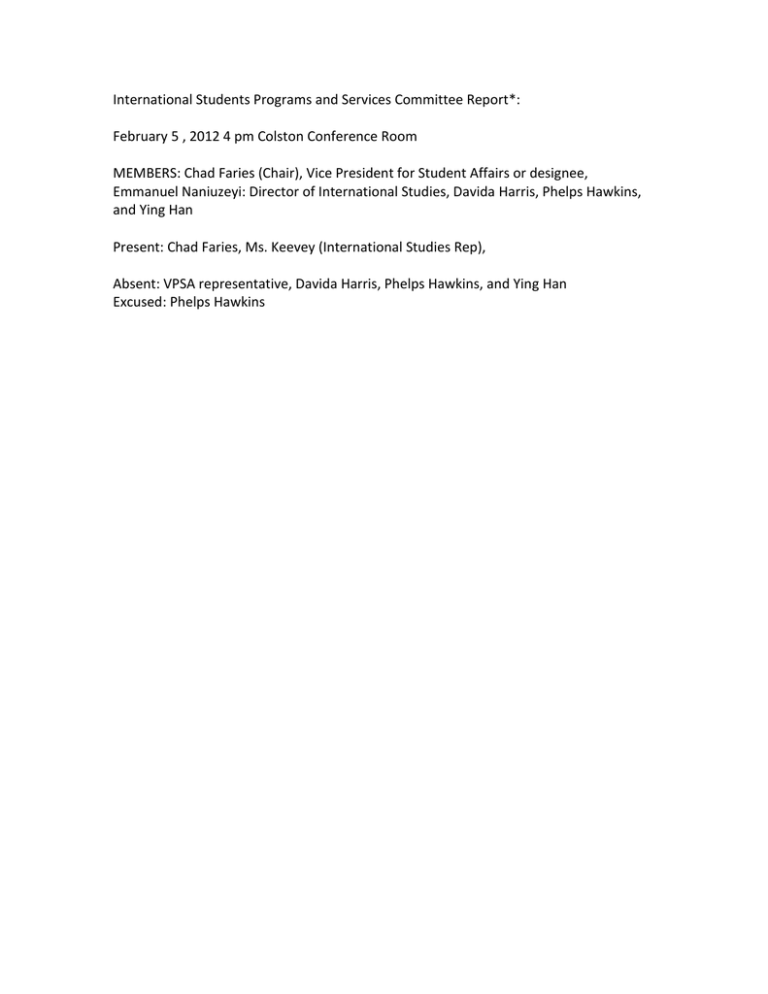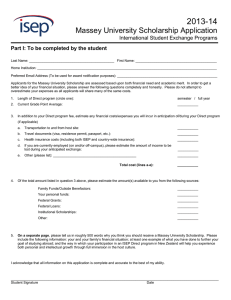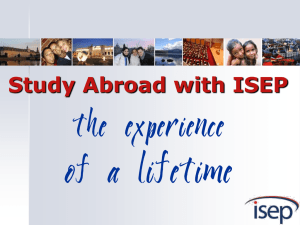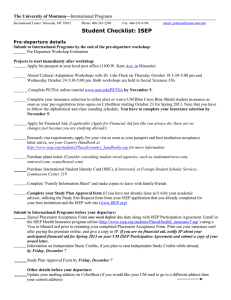International Students, Programs, Services
advertisement

International Students Programs and Services Committee Report*: February 5 , 2012 4 pm Colston Conference Room MEMBERS: Chad Faries (Chair), Vice President for Student Affairs or designee, Emmanuel Naniuzeyi: Director of International Studies, Davida Harris, Phelps Hawkins, and Ying Han Present: Chad Faries, Ms. Keevey (International Studies Rep), Absent: VPSA representative, Davida Harris, Phelps Hawkins, and Ying Han Excused: Phelps Hawkins --Committee acknowledged President Dozier’s commitment to scholarship, development, and international education for offering faculty mini-grants, and study abroad scholarships for students. --Committee thanked Senate for recognizing the achievements of our committee and moving forward a Senate resolution in support of providing resources for international students. --There was a discussion and briefing of the meeting Dr. Naniuzeyi and I had with Drs. Verret and Clark, and Ms. Bradley. This meeting was called after our committee report at the November Senate meeting. The meeting revisited resources for international students: -We discussed who was responsible for ensuring programming is happening and where the funds for something like a city tour would come from. It was agreed that their needed to be CENTRAL LEADERSHIP that orchestrated the student groups, International Office, and Student Affairs. Our committee agrees that this is imperative and we as a committee can only make recommendations. -We discussed a place on campus that could be designated as an international lounge where the students could come and relax, watch movies, etc. Adam’s Hall was suggested but Dr. Clark stated there were obstacles and that we would revisit the issue. Money was available for some furnishings. -It was determined that some SAAB money could be reallocated toward the International Office, but a formal request and proposal would have to be made. -Dr. Faries’ concern was that though the discussion was constructive, who would be responsible for the follow-through on all these excellent ideas. -Again, it was suggested that perhaps someone in student affairs would be accountable. This discussion is especially pressing because of the number of Brazilian students (25) that will be on campus in the fall. --Regarding the previous ESL discussion from the last meeting, an informal faculty survey was sent out to see who was certified to teach ESL on campus. The following are existing faculty who can teach and tutor ESL Vivien Murphy Dr. Frank Brevik Dr. Larisa Shirokova (30 years experience in EFL) The committee recommend that the Rewrite Connection possibly work with these faculty and see if at the very least, tutoring sessions could be made available specifically for students with ESL issues. The Brazilian students will undoubtedly need these resources. --The International Education Center has requested a student worker but hasn’t received one. A student worker could help with the student programming because as it stands it isn’t part of the centers job description. --Another way to get assistance to the international students given the limited budget is internships focusing on International Student Programming. --Again, the issue of an international student space was brought up. Currently students come to the international education center, but that area is much too small. --Finally, a discussion of regular students getting more access to generalized exchange programs like the ISEP (see description below) program, and significantly improving the information campaign for international study opportunities, and their funding sources, for students. We could be using Tigers Roar, the new TV96, and collaborations with Armstrong and SCAD. INFO ON THE ISEP: Established in 1979 under authority of the Fulbright-Hays Act as the International Student Exchange Program at Georgetown University, ISEP was supported by a grant from the (former) United States Information Agency until 1996. In 1997, ISEP was incorporated as an independent organization. ISEP-Exchange each outbound participant pays the cost of an academic term (tuition, housing and meals) at the home institution, for every student sent abroad, the institution receives one in return. ISEP facilitates the exchanges between our members world wide and manages the exchange balances. *The committee shall assist in the recruitment and retention of international students, promote programs for such students, provide advisory and counseling services for such students, and make recommendations to departments and colleges about curricula offerings in the area of international studies. The committee shall promote awareness of international issues through the use of guest speakers, panel discussions, and other cultural activities. The committee shall formulate policy and procedures for the selection of students who will participate in the Study Abroad Program. The committee shall receive applications from prospective study abroad students and shall select student participants. The committee shall monitor the performance of these students in their programs abroad and shall require written and oral presentations from the students upon their return. The committee shall determine the form of the presentations.




